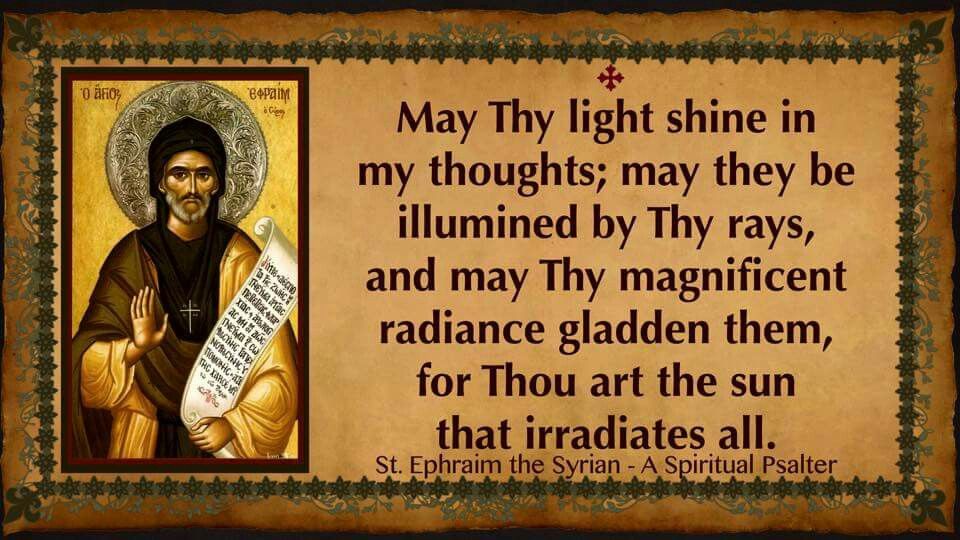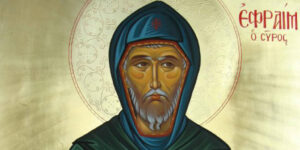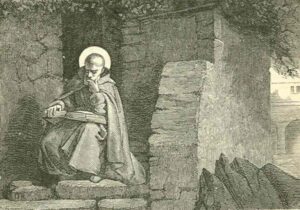
St. Ephrem of Syria was a deacon, hymn-writer, and teacher of the early Church. Ephrem was born C. 306 at Nisibis, Mesopotamia, (modern-day Nusaybin, Turkey on the Syrian border). Nothing is known of his family, except that he wrote that his family was Christian. As a youth, he was mentored and taught by [St.] James (a.k.a. Jacob), the Bishop of Nisibis. Bishop James and Ephrem together founded a great theological school at Nisibis and the bishop appointed Ephrem to lead the school. In addition to teaching, he began to compose Scripture commentaries and hymns. He taught there for many years, while the city of Nisibis was being fought over.
FLIGHT FROM PRESECUTION
When the Emperor Constantine I died in 337, the Neo-Persian empire attacked the city repeatedly, finally capturing it in 363. Neo-Persian rule brought persecution of Christians, and most of them fled the area, including Ephrem, who relocated to Edessa (modern day Sanliurfa, Turkey). This city was a part of the Roman Empire and a significant one in early Christianity. It was at Edessa that the Syriac dialect of the Aramaic language began. Several heretical sects flourished there, including Gnostics, Arians, and Marcionites. Ephrem settled in a cave in the mountains nearby, but he continued to teach and serve the Church in the city.

TOOL FOR FIGHTING HERESY
It was during the last ten years of his life, while living near Edessa, that Ephrem did most of his writing. The language he used was the local dialect of his native Aramaic, which would later become known as Syriac. He continued to teach, but he was primarily focused on preaching and writing. His hymn composition alone was remarkable, and more than four hundred of his hymns are still accessible. He often used hymns as teaching tools, especially to counter contemporary heresies. His mentor and teacher Bishop James had been one of the signatories at the First Council of Nicea in 325, dogmatically defining the full divinity of Christ, so Ephrem was prepared to defend the truths of the Faith against heretics. One of his techniques was to assemble a choir of women to perform his lyrical hymns, especially proclaiming the truths of the Faith in poetic form. His hymns were well known for their great beauty. Ephrem also preached very effectively, and his homilies had a captivating effect on his listeners. He wrote prolifically on Scripture, theology, and apologetics, and was especially eloquent in writing about the Holy Eucharist, the Blessed Virgin Mary, Confession, and papal primacy. In fact, it was Ephrem’s fourth century witness to the certainty of the Virgin Mary’s conception without sin that adds to the proof that this truth was known even in ancient times.
Late in life, Ephrem journeyed to visit [St.] Basil the Great in Caesarea of Cappadocia (currently northern Turkey), who himself was also striving to combat the nefarious errors of Arianism. Basil ordained Ephrem a deacon, but Ephrem declined ordination to the priesthood and returned to Edessa.

THE GOSPEL IN ACTION
During the last year of his life, a severe famine occurred in the region. Ephrem, as an exemplary deacon, conducted a distribution of grains to the most needy people. He also tended to the sick and dying, and saw to the proper burial of the dead. Exhausted, he died in his mountain hermitage, just weeks after the famine subsided, June 9, 373.
St. Ephrem, whose name can also be spelled Ephraim or Ephraem, was an eloquent defender of the Faith during times of dangerous heresies, and a contemporary of such luminaries as Sts. Basil, Athanasius, Ambrose, and Cyril of Jerusalem, Doctors of the Church all. Ephrem was declared a Doctor of the Church in 1920. He led a penitential life, eating and sleeping very little. He possessed a brilliant mind, which he dedicated to the service of Christ and His Church. His writings were given so that the average person could comprehend the reality of the eternal mysteries of the Faith, using the same language as Our Lord and the Apostles. He is remembered as The Father of Hymnody, The Sun of the Syrians, Mary’s Own Singer, and most commonly, The Harp of the Holy Spirit. His feast day is June 9, and he is a patron for poets, Syrians, and spiritual directors. He is often depicted with a lyre as a symbol of his hymn writing.
